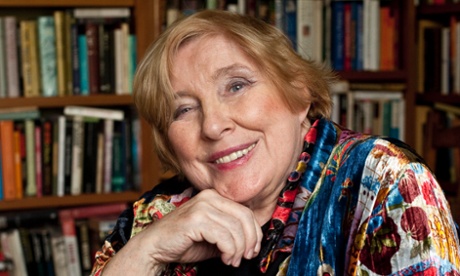
Your collection of short stories, Mischief, spans four decades and ends with a new novella, The Ted Dreams, in which the narrator turns out to be psychic. Has anything supernatural happened to you?
I used to get whisked into hospitals all over the world with a condition called paroxysmal tachycardia, in which my heart stopped, so I’ve had lots of brushes with the other side. I did once see the pearly gates, but they weren’t pearly – more like a very bright Asian temple in fluorescent purple and orange. I could feel somebody trying to pull me back, and then I woke up in Salisbury General. I quite miss the drama of the crash team now they’ve finally fixed me.
You’re a practising Christian, which some find surprising.
I go to church at 8am most Sundays, instead of a therapy group. It’s very good to spend half an hour thinking about something beyond oneself, and I like knowing that people have worshipped there for 1,000 years. It’s not fashionable, and I know you’re assumed to be naive, but the Christians I know are extremely good people who “believe” in a metaphorical rather than a literal way. I find atheism infinitely depressing.
Is there such a thing as a Weldon heroine? Yours tend from the start to be domestic skivvies, seduced and betrayed until they get out – I particularly enjoyed your story in which tragic heroines like Emma Bovary and Anna Karenina don’t die, but get jobs in a New York shop.
My heroines are always on the verge of leaving their marriages, but some don’t quite make it. I write about archetypes, I suppose. Most people feel there must be something more, and better. I’m saying the grass is greener but it can also be quite swampy. We’re sedated by sex, by oxytocin. The only time women are really themselves is when they have PMT and turn into people who are vile, nasty and mean. But since I began writing, men have changed: they’ve become more maternal. They’ve had to. Now women earn, they can leave, taking the children with them.
You’ve written a book of essays about Jane Austen, and your acerbic domestic comedies have often been compared to hers. Is she your biggest literary influence?
Good heavens, no! It’s Hans [Christian] Andersen. What I’m doing is writing parables, as he did, but with a twist. When I began, women needed to be taught the truth about love, babies, money, men. They seemed to know so little and be fed so many misapprehensions. I daresay I had the confidence to do it because I was reared in an all-female family, had a baby without a husband, got a job and took no notice of what men thought. I was once told I shouldn’t take promotion because it was taking bread out of the mouth of a male breadwinner. Which was true, then; now one male wage can no longer support a family anyway.
You also teach creative writing at Bath Spa. How has that affected you?
If you teach, you can’t help learning – which was very good for me, but earlier on I relied more on instinct than orthodoxy and on a pen, not a computer. I think I was better when I didn’t doubt but just did it, bold and certain. The Ted Dreams took me back to writing about an unhappy marriage, but now one where the paranormal and pharma-science clash.

